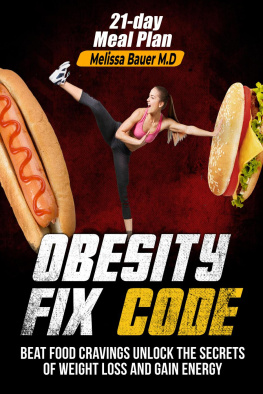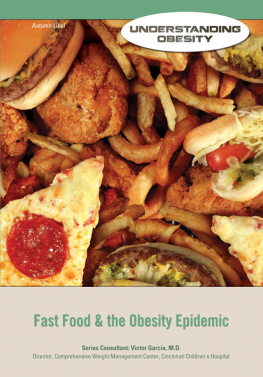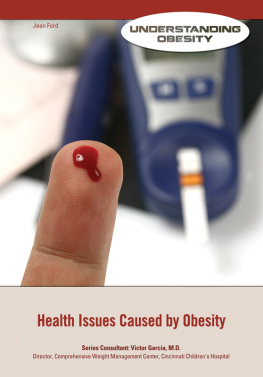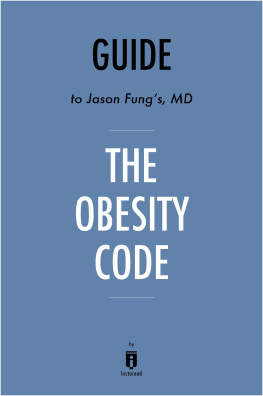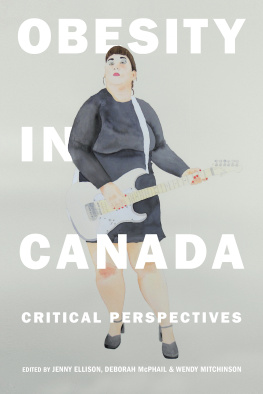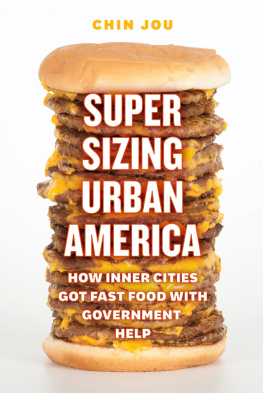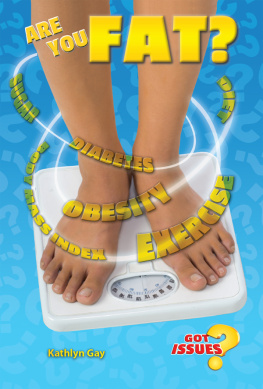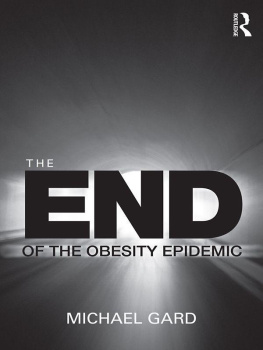
WEIGHING IN
CALIFORNIA STUDIES IN FOOD AND CULTURE
Darra Goldstein, Editor

WEIGHING IN

OBESITY, FOOD JUSTICE,
AND THE LIMITS OF CAPITALISM
Julie Guthman

University of California Press, one of the most distinguished university presses in the United States, enriches lives around the world by advancing scholarship in the humanities, social sciences, and natural sciences. Its activities are supported by the UC Press Foundation and by philanthropic contributions from individuals and institutions. For more information, visit www.ucpress.edu .
University of California Press
Berkeley and Los Angeles, California
University of California Press, Ltd.
London, England
2011 by Julie Guthman
Library of Congress Cataloging-in-Publication Data
Guthman, Julie.
Weighing in : obesity, food justice, and the limits of capitalism / Julie Guthman.
p. cm.
Includes bibliographical references and index.
ISBN 9780-520266247 (cloth : alk. paper)
ISBN 9780-520266254 (pbk. : alk. paper)
1. Obesity, Social aspects. I. Title.
RA645.O23G88 2011
362.196398dc22
2011003848
Manufactured in the United States of America
20 19 18 17 16 15 14 13 12 11
10 9 8 7 6 5 4 3 2 1
This book is printed on Cascades Enviro 100, a 100% post consumer waste, recycled, de-inked fiber. FSC recycled certified and processed chlorine free. It is acid free, Ecologo certified, and manufactured by BioGas energy.
To Mom, for Sierra

CONTENTS

ACKNOWLEDGMENTS
This book was conceived several years ago and emerged in part from several small research projects, some of which were supported by the University of California at Santa Cruzs Committee on Research and Social Science Division. I am thankful for this support. I am also thankful to Sarah Yahm and Amy Morris, graduate students who helped out with this earlier research.
Sometime in 2004, my colleague Melanie DuPuis and I first pounded out an article that became the backbone of this book. This book would not exist without her insights and encouragement. I am grateful, too, to Len Whitley-Putz, who worked as the course assistant when I first taught the Politics of Obesity class in 2005. Her provocations and the course responses convinced me that there was a bigger story to tell. The book began to take form at a residential workshop at UCs Humanities Research Institute at UC Irvine in the fall of 2006. True to the intent of these workshops, those ten weeks away from my usual responsibilities provided the space and conversation to launch the project.
Over the years a number of people provided ideas that came to matter in this text, among them Joe Bryan, Mike Goodman, Jessica Hayes-Conroy, J. P. Jones, Jake Kosek, Katie LeBesco, and Kimberly Nettles. Amy Ross was especially influential with her always trenchant insights, this time about the conflation of self-care and philanthropy. Likewise, conversations with Becky Mansfield about the human body as a site of both ecological transformation and biopolitical discourse helped me see how to meld two very different approaches. I met Anna Kirkland, whose perspectives are quite close to my own, late in the process. Apparently, we were thinking and writing similar things at the same time; I worry she is underacknowledged in the text.
It was not until late in the project that I realized I was following a science studies approach of sorts. Scientists I interviewed and with whom I discussed the project were extremely generous with their comments and resources. Several coffees and email discussions with Katherine Flegal of the Centers for Disease Control and Prevention were particularly useful, as were my discussions on endocrine disruption with Retha Newbold of the National Institute of Environmental Health Sciences and Bruce Blumberg of UC Irvine. The Science and Justice Working Group at UC Santa Cruz was also influential in the development of my thinking.
Colleagues who commented on draft chapters and otherwise substantially supported the project include Alison Alkon, Charlotte Biltekoff, Aaron Bobrow-Strain, Melissa Caldwell, Carolyn de la Pena, Melanie DuPuis, Ryan Galt, and Paul Robbins. Sharing pieces of this work at the Environmental Politics Colloquium at UC Berkeley, the UC Multicampus Research Program on Food and the Body, and BFP (an informal working group) was tremendously useful for working through key ideas. Talks in geography departments at the Universities of Minnesota, Georgia, and British Columbia, Penn State, and Clark sharpened my thinking. I am extremely grateful to be part of all of these intellectual communities.
The manuscript itself was profoundly transformed and improved thanks to the tough love of two reviewers. I owe Susanne Friedberg and Becky Mansfield a huge debt of gratitude for their detailed in situ comments and broader pushes to align my abundant arguments. Other close friends and family generously read and commented on nearly finished chapters in ways that made the text more readable: Jerry Kohn, Michael McCormick, Andrea Steiner.
At UC Press, Jenny Wapner was an extraordinarily gifted and kind hands-on editor whose deep engagement in the project made her comments so very useful. I was really sad when she left the press and I particularly appreciate her continued support thereafter. In Jennys wake, Sheila Levine and the production staff handled the manuscript with aplomb. I wish to thank Madeleine Adams for her superb work during the copyediting phase. Id be remiss if I didnt mention Peter Wissoker, formerly at Cornell University Press, who encouraged the project and gave terrific feedback at the books most inchoate stages. Thanks to Debora Pinkas for important advice.
The Community Studies Department at UC Santa Cruz played an enormous role in the shape, direction, and completion of the book, for better or for worse. For better, Ive had the good fortune to work with some of the smartest and most engaged undergraduates one could find. They have been my muses and inspirations for much of what is in this book and have shaped my thinking as much as they say I have shaped theirs. I hope they will forgive me for using their comments and ideas as rhetorical devices. For worse, I have written this book during a sustained effort by some in the universitys administration to eliminate the department, allegedly for budgetary reasons, although many observers would argue that it reflects the unfortunate neoliberalization of the university. As I write this, I do not know the final outcome. The stress of simultaneously putting this book together and trying to keep this groundbreaking department alive was too much to bear at times. Nonetheless, it gave me a newfound understanding of social movement strategy, which is in some sense a subtext of this book. Special shout-outs to Mary Beth Pudup and Andrea Steiner for being the best of colleagues in the worst of times. I have learned a great deal from working with them. And many thanks to Joan Peterson for steadfast commitment to the department and our students.
Next page

